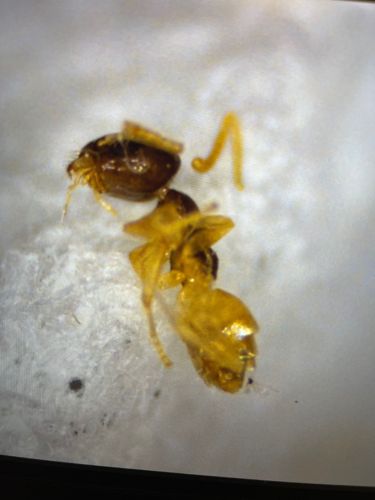Pharaoh Ant
Scientific Name: Monomorium pharaonis
Order & Family: Order: Hymenoptera, Family: Formicidae
Size: Workers typically range from 1.5 to 2 mm (0.06 to 0.08 inches) in length. Queens are slightly larger, around 3.5 to 5 mm (0.14 to 0.2 inches).

Natural Habitat
Pharaoh ants are primarily indoor pests in temperate regions, thriving in warm and humid environments. They are commonly found in homes, hospitals, nursing homes, food establishments, and other buildings. They build nests in hidden locations such as wall voids, behind baseboards, under floors, inside appliances, and in electrical outlets. In tropical and subtropical areas, they can also be found outdoors.
Diet & Feeding
Pharaoh ants are omnivorous scavengers. Their diet includes a wide range of foods such as sugars, fats, proteins, dead insects, and even other ant species. In indoor environments, they commonly forage for crumbs, grease, sugary spills, and pet food.
Behavior Patterns
Pharaoh ants are highly adaptive and form large colonies with multiple queens (polygynous), which allows them to bud off new colonies easily if disturbed. They tend to have erratic and unpredictable foraging trails. They are known for establishing nests in hidden, warm, and humid areas. Due to their budding behavior, conventional pest control methods like baiting can sometimes spread the infestation if not applied correctly.
Risks & Benefits
Risks: Pharaoh ants are considered significant nuisance pests. In healthcare settings, they pose a serious health risk as they can transmit pathogens (e.g., Salmonella, Staphylococcus, Clostridium) by crawling over contaminated materials and then food or sterile equipment. They can also infest sterile packaging, wound dressings, and IV lines. They are difficult to control due to their budding behavior and small size, which allows them to penetrate small cracks. Benefits: In natural ecosystems, ants can play a role in nutrient cycling and seed dispersal, but as indoor pests, their benefits are minimal.
Identified on: 9/4/2025